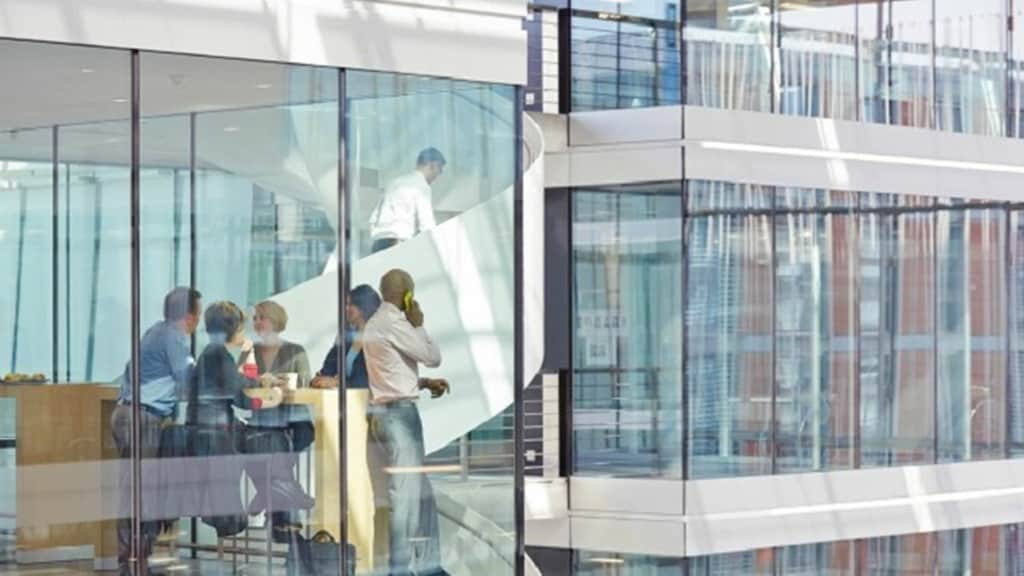
As a professional services firm our environmental impact is small compared with many other industries. But our clients, our people and other stakeholders still expect us to minimise our impact, and as a responsible business whose operations ultimately rely on natural resources, we want to do everything we can. So, driving a net zero and sustainable future is an important element of our Purpose.
Most of our operational impact comes from carbon emissions generated by business travel and the use of energy in our buildings. Our carbon mitigation programme is central to our efforts, and we also offset our operational carbon emissions as reported each year. Additionally, we work to reduce the resources that we consume in our operations, and the waste we generate. Read more in our Acting on Carbon: Lessons Learnt document.

- Our approach
- Opportunities and risks
- Targets
- Awareness and education
- Valuing our impact
Our approach
Our environmental policy outlines our approach to managing and reducing our operational impacts and provides the framework for our environmental targets. Overall, we’re pleased with our performance against these since our 2019 baseline, which we publish annually in our Integrated Reporting Hub.
We have an environmental management system which has been certified to the international standard ISO 14001 since 2008, for all of our UK offices where we have operational control, and we’ve held the ISO 50001 energy standard since 2012.
We engage our people to raise awareness of sustainability issues and encourage them to take action to reduce their environmental impacts, and we encourage our key suppliers to take action in particular areas through our supply chain sustainability programme.
We’re proud to have achieved a number of recognised standards in environmental management – particularly from the Carbon Trust and BREEAM. You can find out more about these in our credentials section.
We measure our progress against our environmental targets throughout the year and report externally at the end of each financial year in our Annual Report.
Opportunities and risks
Disruptions to our energy supply or from extreme weather can impact the operation of our offices and our ability to travel, both of which are integral to our ability to deliver our services to our clients. We proactively manage these risks through our business continuity and environmental management systems. We’ve outlined this in our response to the recommendations of the Taskforce on Climate-related Financial Disclosure (TCFD).
However, our clients and other stakeholders also expect us to actively manage our environmental performance as part of our approach to being a responsible business. This represents an opportunity for us as it influences our reputation, and gives us a chance to innovate and differentiate ourselves. Additionally, our Sustainability practice provides advice to clients on environmental impacts, so we aim to ‘walk the talk’, adopting best practice in our own operations, and make our case studies and lessons learned publicly available to stakeholders. We also know from our internal analysis that our environmental performance is important to our people and influences their view of the firm as a great place to work.
Improving our environmental performance also makes good commercial sense as it helps us to reduce costs from the resources we consume. We estimate that - cumulatively - we’ve saved over £45m in operational costs between 2007 and 2023, as a result of our initiatives. These savings have primarily come from avoided energy, paper and water consumption, and carbon-related costs associated with our voluntary commitment to offset our residual carbon emissions each year, and until 2019, the government’s CRC scheme. We also save on the cost of avoidable business travel.
Targets
Measuring and reporting on our progress in a transparent way is a key principle that underpins our strategy, so we have metrics and targets for each area of our Responsible business framework, aligned to our material issues and the Sustainable Development Goals.
In 2020, PwC set Net Zero targets with 2030 commitments however, we have also set shorter term 2025 targets to help inspire a step-change in our performance. We review all of the metrics at least annually to ensure ongoing alignment with the strategy and expand our scope.
The Executive Board are updated on progress during the year, and we publish our progress in our Integrated Reporting Hub. This undergoes limited assurance to the ISAE 3000 and ISAE 3410 standards by our external financial auditors each year.
Awareness and education
We’ve been supporting our people to enjoy more sustainable lifestyles both at work and at home for over a decade. We do this through a range of events and campaigns for our people - highlighting what we are doing as a firm and encouraging further action to reduce our impact on the environment.
2023 saw us create new ways to encourage our people to act on climate change - with a particular focus on the connection between nature and net zero. That action has included opening an edible garden in our London Embankment Place office, launching our Nature Network and hosting screenings of WWF film 'The Business of Nature'.
We’re also particularly proud to have held our sixth consecutive Veganuary Workplace Challenge, which not only supports our people to try new plant-based options, but also highlights the ways we’ve reduced the carbon impact of our catering. Over 620 people participated in the challenge in 2023 and since the challenge started over 2,700 Veganuary pledges have been made.
Valuing our impact
We’re also shaping the debate on important environmental issues and collaborating with our clients on their environmental impacts.
We’ve made our methodology ‘open source’ as part of our contribution to the technical development of the Natural Capital Protocol.







